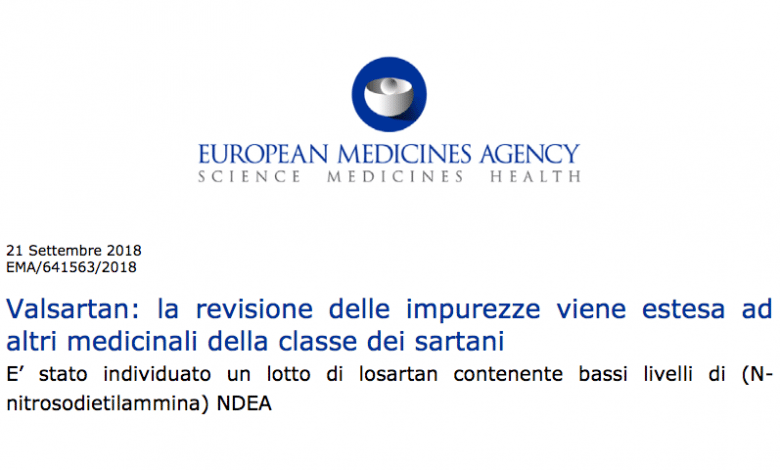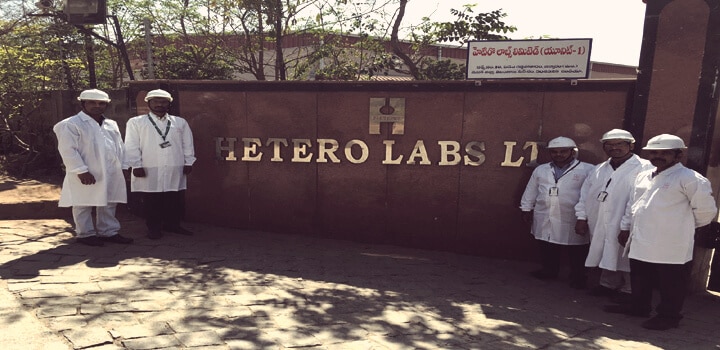
The European Medicines Agency (EMA) has extended the revision of the impurities detected in valsartan following the detection of very low levels of N-nitrosodiethylamine (NDEA) in another active substance, losartan, manufactured by Hetero Labs in India.
Following the identification of this impurity by the German authorities, the review will now extend to medicines based on four other 'sartans', namely candesartan, irbesartan, losartan and olmesartan.
 Like valsartan, these active substances have a specific ring structure (tetrazole) the synthesis of which could potentially lead to the formation of impurities such as NDEA. Other medicines in the class that do not have this ring were not included in the review.
Like valsartan, these active substances have a specific ring structure (tetrazole) the synthesis of which could potentially lead to the formation of impurities such as NDEA. Other medicines in the class that do not have this ring were not included in the review.
Both NDEA and the related compound N-nitrosodimethylamines (NDMA) are classified as probable human carcinogens (substances which may cause cancer). How these impurities arose during the manufacture of the sartans has yet to be fully established and is being evaluated in the ongoing review.
Based on the traces of NDEA found so far in one batch of losartan manufactured by Hetero Labs, there is no immediate risk to patients.
Therefore, patients are advised not to stop taking losartan or other sartan medicines without talking to their doctor.
Further tests are required to determine the extent of contamination and whether impurities are present in sartan medicines above levels that can be considered acceptable.
This review was triggered when unacceptable levels of NDMA were found in some valsartan medicines, which have now been withdrawn in the EU. Subsequently, NDEA was identified in some of the recalled valsartan products.
Extending the review to other sartans is precautionary. EMA is working closely with national authorities, international partners and theEDQ extension to collect data on these medicines as quickly as possible. EMA will continue to deliver updates as more information becomes available and will take all necessary actions to protect the health of patients
Read more about the medicine
Candesartan, irbesartan, losartan, olmesartan and valsartan belong to the class of medicines known as angiotensin II receptor antagonists (also known as sartans).
These medicines are used to treat patients with hypertension (high blood pressure) and those with heart failure or who have recently had a heart attack. They work by blocking the action of angiotensian II, a hormone that narrows blood vessels and raises blood pressure.
Read more about the procedure
The review of valsartan-containing medicines was started on 5 July 2018 at a request from the European Commission, under theArticle 31 of Directive 2001/83/EC.
On 20 September 2018, the review was extended to medicines containing candesartan, irbesartan, losartan and olmesartan.
The review is carried out by the Committee for Medicinal Products for Human Use (CHMP), responsible for questions relating to medicines for human use, which will adopt the opinion of the Agency. The CHMP opinion will then be forwarded to the European Commission, which will issue a final legally binding decision applicable in all EU Member States.
Valsartan: review of impurities extended to other sartan medicines
Related news: Hetero Labs recalls over 15.90 lakh bottles of hypertension drug from US
Valsartan, Codacons submits the first claim for damages
Note: More than 20 European countries, Canada and the United States recalled valsartan drugs after NDMA was discovered in active pharmaceutical components. Requests to initiate a class action lawsuit against the pharmaceutical companies that marketed valsartan were filed in Canadian courts in mid-July. In the United States, litigation arising from recalls is in its infancy. The plaintiffs allege: misrepresentations about the safety of the drug; misleading advertising; fraud; strict liability for a manufacturing defect; negligence; and the complex of bodily harm caused to the plaintiffs.






